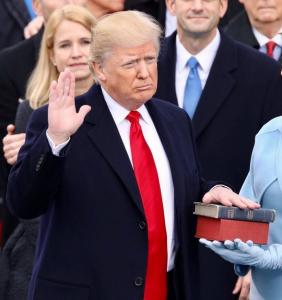 Today’s text is rich with ambiguity, like so many of the complex tales recorded in the books of Samuel, surely among the finest literature in the ancient world. The story itself is well known. Samuel, having been left with the aging priest Eli at the shrine of Shiloh by his mother in fulfillment of her vow that finally brought her a son, “was ministering (serving) YHWH in the presence of Eli” (1 Sam.3:1). Though the NRSV translates “under Eli,” which may be the implication due to Samuel’s youth, the Hebrew merely says that Samuel’s service was done in Eli’s presence. It was a difficult time for Israel, because “YHWH’s word was very precious (that is “rare”) in those days; visions were hardly seen” (1 Sam.3:1). Eli’s advanced age and near blindness, though he remained chief priest, were debilitating factors in the lack of divine contact in the land.
Today’s text is rich with ambiguity, like so many of the complex tales recorded in the books of Samuel, surely among the finest literature in the ancient world. The story itself is well known. Samuel, having been left with the aging priest Eli at the shrine of Shiloh by his mother in fulfillment of her vow that finally brought her a son, “was ministering (serving) YHWH in the presence of Eli” (1 Sam.3:1). Though the NRSV translates “under Eli,” which may be the implication due to Samuel’s youth, the Hebrew merely says that Samuel’s service was done in Eli’s presence. It was a difficult time for Israel, because “YHWH’s word was very precious (that is “rare”) in those days; visions were hardly seen” (1 Sam.3:1). Eli’s advanced age and near blindness, though he remained chief priest, were debilitating factors in the lack of divine contact in the land.
But that soon changes as Samuel, the young temple servant, receives a visitation from YHWH. Famously, God calls him three times, each time running toward the old priest, imagining that he has demanded the boy’s presence. During the third visit, Samuel is given a monstrous task; he is commanded by YHWH to announce to his old mentor that his days as YHWH’s priest are over, based on the fact that though Eli’s sons were “blaspheming for themselves,” perhaps meaning “on their own,” Eli did nothing to restrain their evil (1 Sam.3:13). As a result, YHWH shouts, “I swear to the house of Eli that the evil of Eli’s house will not be covered over (expiated) by sacrifice or (any sort of) offering forever” (1 Sam.3:14)! The very first words from YHWH that Samuel claims to have heard involve the cruel deposition of a failing priest, an old, blind man who has spent all of his days in YHWH’s service. And that there is no way ever for the ancient servant to find any forgiveness from God! With those withering words, Samuel imagines that his role as prophet in Israel must include harsh and unyielding demands from his God. Words do matter!
As the story continues, Samuel is reluctant to relay the horrible prophecy to Eli, acting as if nothing has happened. He “opens the doors of the temple,” as always, because “Samuel was afraid to tell the vision to Eli” (1 Sam.3:15). But the old man is having none of it; he demands from the boy the full truth of what YHWH has said. So, Samuel “told him everything and hid nothing from him” (1 Sam.3:18). YHWH’s harshness is matched by the servant Samuel. Eli’s reply is instructive and richly ambiguous. It may be read as: “It is YHWH who will do whatever is good in the God’s eyes,” a clear statement that YHWH’s will may never be questioned or contradicted. Or it may read, as in the NRSV: “It is YHWH; let ‘him’ do whatever seems good to ‘him’.” The latter translation suggests that YHWH is free to act however YHWH wishes, and Eli accepts fully those actions. The former reading may imply that YHWH is indeed a harsh and demanding God, and cannot be questioned in any way. The difference is subtle but important. Either God is a cruel taskmaster who bends followers to every divine whim, or YHWH is free to offer good or bad favors to the people, and is completely free to provide either. In either case, YHWH is fully free, but in the former YHWH is decidedly pitiless and hardhearted.
I would suggest that Samuel, because he has first experienced YHWH as a God who demands that he announce a complete rejection of Eli, is quite likely to have understood Eli’s words in the darker sense. YHWH is a God, Samuel is now convinced, who insists on absolute obedience especially when the divine commands are painful and difficult. In the subsequent story of Samuel and his prophecies for YHWH, he will display very little if any grace or comfort in the course of his words. He will be convinced beyond any argument that his words are YHWH’s words and must be followed to the letter. Such a belief, an ancient fundamentalism, will lead Samuel ultimately to confuse his personal words, based on his personal angers and frustrations, with YHWH’s words, imagining that every word from his mouth are nothing less than words directly from the divine lips. Words do matter!
Last Jan.6, we all witnessed another case where words definitely mattered. Donald Trump invited a crowd of his followers to the capitol, and in a fiery speech incited them to mob violence. Though some have tried to argue that Trump’s speech to the crowd that morning was merely another example of his usual series of empty claims about the election having been stolen from him by nefarious forces of Democrats, socialists, and Antifa leftists, the content of the speech says otherwise. Our hallowed 1stAmendment to the Constitution fully protects legitimate political debate, including speech many may find nothing less than repugnant, but it cannot and does not protect speech that incites a crowd to imminent lawless action. The Supreme Court has ruled again and again that “shouting fire in a crowded theater, where there is no fire,” is not protected speech. Trump incited the crowd to the violence that quickly followed.
In an article in the Los Angeles Times on Jan.12, 2021, Richard Ashby Wilson, Associate Dean of the University of Connecticut School of Law, and an expert on incitement law, suggests three elements must exist to judge a speech incitement. First, the speaker must advocate a crime. Trump called on the crowd to the “Save America” rally with the words “Be there. Will be wild!” In the speech that morning he encouraged the crowd to march to the capitol and “fight,” an explicit call to a lawless act. He further told the seething crowd that they should fight “bad people,” adding “You’ll never take back our country with weakness. You have to show strength, and you have to be strong.” Earlier, Rudy Giuliani, Trump’s personal attorney, had urged the crowd with the phrase “trial by combat,” and Donald Trump, Jr. warned Republican legislators who did not agree to contest the election results, “We’re coming for you!”
The second element of incitement is that the crime must be imminent. Trump called on the crowd to march immediately to the capitol building, which they proceeded to do. Thirdly, it must be demonstrable that the incited crime actually occur, which the nation saw all too clearly in the images beamed world-wide in real time. It was reported that after invading the building, one Trump supporter said, “Our president wants us here,” while another shouted, “We wait and take orders from our president!” If a lawyer wants to build a case for criminal incitement against Trump, he or she might say “his words were causally connected to the subsequent harms, and thus could satisfy the criminal law’s test of causation” (Richard Ashby Wilson). Wilson concludes his article, “The law of incitement was designed to protect the public from exactly this kind of politics of violence.” Words do matter!
Samuel became an unyielding and obdurate prophet precisely because he was convinced from his earliest days that YHWH, his God, was stern and bleak in the divine demands. In the end, it led him to confuse his words with YHWH’s, creating him a demanding and unquestioned champion of his own power, impeding his ability to listen to anyone’s reason but his own. He became that way because words do matter. Donald Trump’s words on Jan.6 were surely a criminal incitement of his followers to do just as they did, namely to invade and trash our historic national capitol. Four years of his presidency, marked by lies and wild, often absurd words from the mouth of this man culminated on Jan.6 with words of criminal incitement to violence. His legacy is forever tarnished and disgraced by this monstrous act, as once again we all learn that words do matter!
(Images from Wikimedia Commons)











